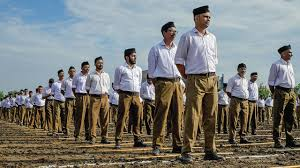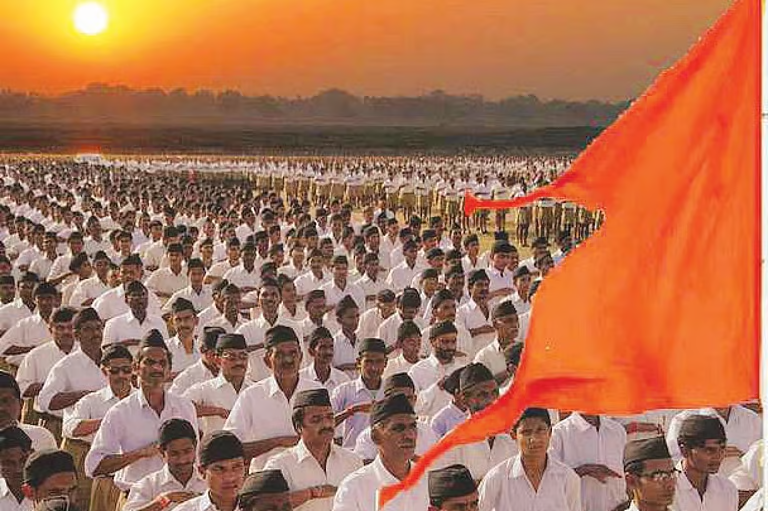The RSS has kicked off celebrating/observing the centenary year of its establishment.
There's a global mission as Bharat/India is marching ahead to turn world's third largest economy.
Bharat being an ancient culture with rich traditions has the experiential wisdom to create a harmonious world.
It's momentous occasion. The Sanghparivar fountainhead obviously looking the months and weeks ahead as a time period for greater push to Hindutva.
One way is to increase the number of its branches to one lakh across the country.
"The Sangh believes that Hindu society will be able to fulfil its global responsibility effectively only on the basis of an organised and collective life, full of self-confidence founded on Dharma. Therefore, we resolve for building a model society following harmonious practices rejecting all types of discriminations, promoting value-based families founded on eco-friendly lifestyle," said a statement from the RSS on March 23.
There is another key aspect. Both the RSS and the BJP - which takes RSS as its mentor - are understanding the importance of unity of purpose vis-a-vis seeing their vision, direction and relations in the right perspective on the issues related to social harmony, national economy and also elementary and broad matters pertaining to temples, mosques, Hindus and Muslims and also other minorities such as Christians.
As a result the 'controversies and the truths' related to Christianity are also likely to figure prominently in discussions and debates.
There was a time the western media tried to dismiss the depth of RSS's ability and reach as a nationalist voluntary group. Even phrases such as "bored young men find purpose" were used.
Today that 'understanding' is better.
Maybe it goes without stating two key players - RSS chief Mohan Bhagwat himself and Prime Minister Narendra Modi (also a former RSS foot soldier) appreciate the fact that there is (there should not be) any major difference between them.
It is a different matter that they can "independently be active" in the work of their respective organizations and governments.
One may add here, as happens with all human organisations including families - there will be few differences in terms of opinion and perspectives. There have been even "divisions" among internal power centres in Arya Samaj, Hindu Mahasabha, Congress party, the Communists etc, similarly in BJP and RSS too; there have been some radicals in both the camps.
These are probably blown out of proportion time and again by forces which are inimical to Hindu unity and also India's (Bharat's) national interests.
In general sense the strategy and target remain the same as was in 2014-15 or even earlier.
The RSS is committed to : Spreading its Hindu-first ideology to all corners of India by propelling the ruling party BJP to power most states including a few 'difficult' terrains such as West Bengal and Kerala.
Of course, the Rashtriya Swayamsevak Sangh has provided the foot soldiers in 2024, 2019, 2014 general elections victory under Narendra Modi.
Dattatreya Hosabale is a key functionary in 2025.
Way back in 2014, he had said - “The 2014 election victory should be seen as the starting point of a long-term mission".
The BJP has since then worked overtime in difficult states and 'red-forte' like Tripura and would want to capture power in other states as well.
Because only then can significant social, political and cultural changes take place in this country.
That is why coming elections in Bihar (2025) and West Bengal, Assam, Tamil Nadu and Kerala (in 2026) would be very crucial. Among these states - 10 years back in 2016 -- the saffron party could form government only in Assam.
In 2021, it made significant inroads in Bengal - the prominent one-time communists' bastion. But in 2026 - it has to be achieve almost a miracle.
Notably, the Modi government has appointed RSS sympathizers to prominent positions including a few vice chancellors, chairman of the Film and Television Institute of India (FTII), the chairman of the Indian Council of Historical Research and a few Governors.
A reference can be made about RSS/BJP's growth in West Bengal.
In 2017, the internal reports found that both the number of shakhas and affiliated educational institutions have increased in the eastern state where the BJP's arch rival is a Muslim-appeasing Trinamool Congress.
While there were just 580 shakhas in West Bengal in 2011, the number rose to 1,280 in 2014 and 1,492 in December 2016.
Of the total number of shakhas, south Bengal has the majority with 1,069 whereas north Bengal has 426. The report stated that within a year in 2015-16, 295 new shakhas were opened in the State.
RSS-affiliated schools have also seen a phenomenal rise in numbers. There are around 309 RSS-affiliated primary schools in the state in which 3,193 appointed educators teach around 66,090 students.
Of the total students, around 23,069 are girls. Schools in the North and South 24 Parganas districts; Malda, Coochbehar and Nadia have witnessed the most growth. (2017 report)
Of course, the Sangh and selfless Karyakartas and Pracharaks have over the decades earned the unwavering trust and affection of the 'samaj'/Society.
Sangh Swayamsevaks have strived to carry everyone along with the strength of love and affection, rising above honours and insults, likes and dislikes.
"On the occasion of the Sangh’s centenary year, it is our duty to remember the Pujya Saints and the righteous people (Sajjan shakti) in the society whose blessings and cooperation have been of great strength amidst all odds".
ends
https://www.rss.org/Encyc/2025/3/23/Resolve-on-the-occasion-of-Sangh-Centenary.html









No comments:
Post a Comment